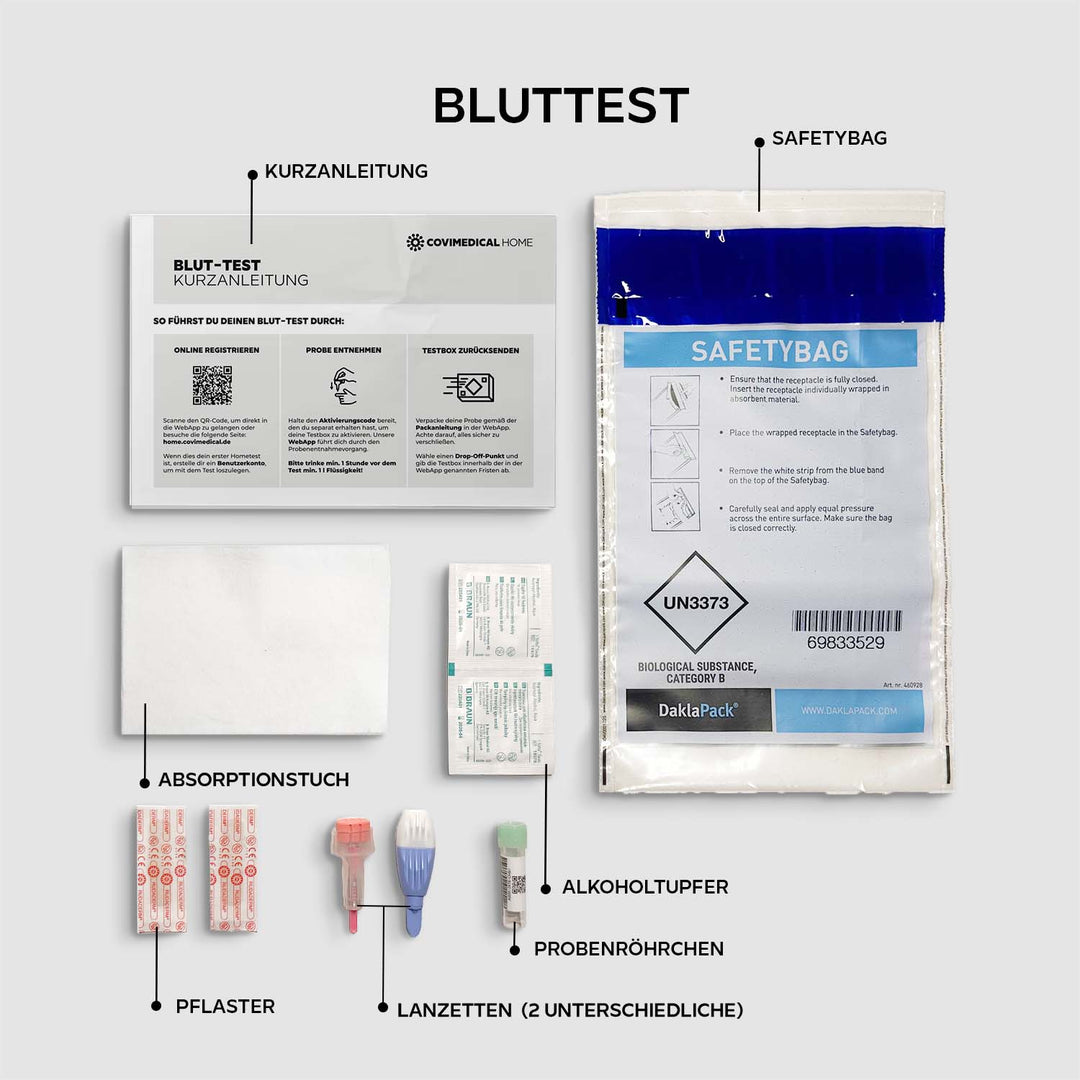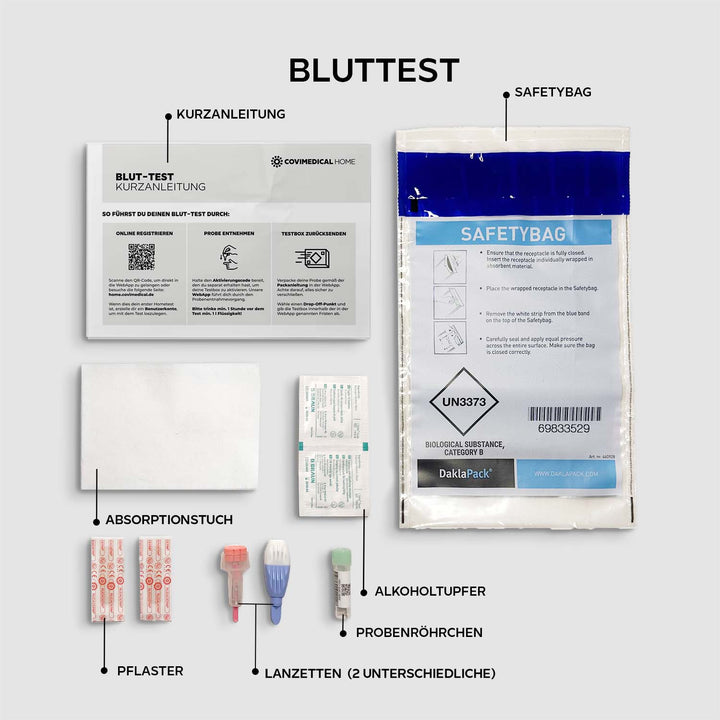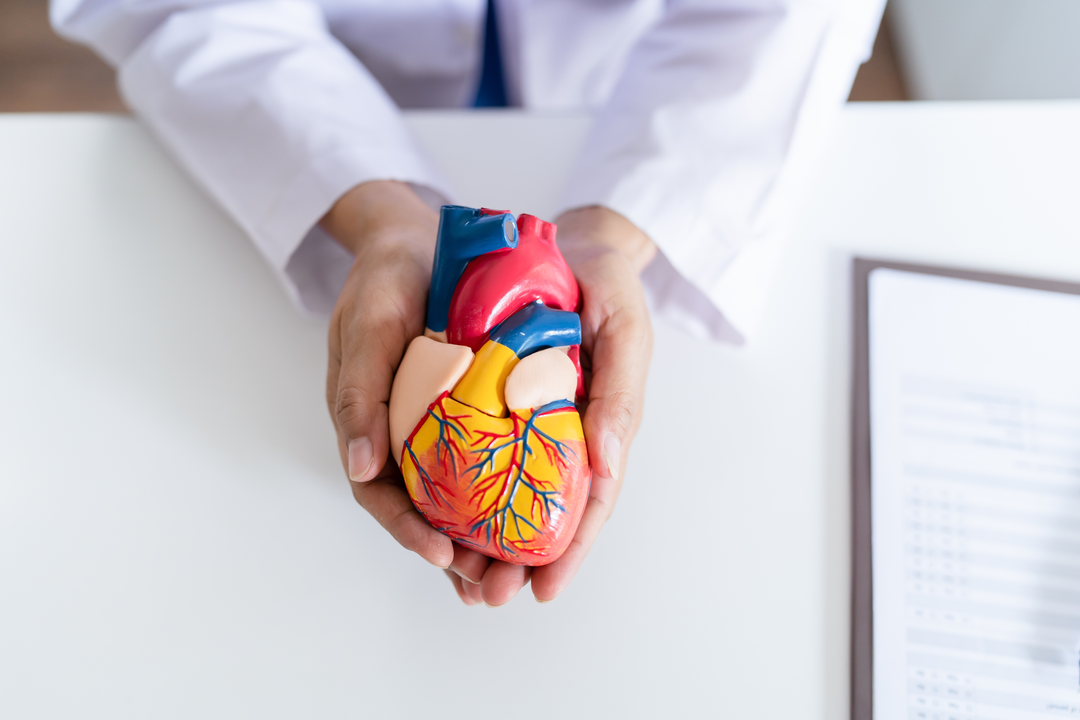This test tests your sample for 3 different heart parameters:
Total cholesterol
What is total cholesterol?
• Total cholesterol is a lipophilic, fat-like substance synthesized in the liver and other tissues. It is an important component of cell membranes and serves as a precursor for the synthesis of hormones and bile acids.What role does total cholesterol play in the body?
• Total cholesterol is responsible for many vital functions in the body, including the formation of cell membranes, the production of hormones such as estrogen and testosterone, and aiding in digestion through the production of bile acids.What role does total cholesterol play in cardiovascular disease?
• Elevated total cholesterol levels can increase the risk of cardiovascular disease because it can lead to plaque formation in the arteries. These deposits can restrict blood circulation and lead to arteriosclerosis (hardening of the arteries).Are there typical symptoms of an increased total cholesterol level?
• No, elevated total cholesterol levels usually do not cause specific symptoms. Therefore, a blood test is necessary to determine cholesterol levels.How to get total cholesterol checked?
• Total cholesterol levels can be determined through a blood test. It is recommended to check cholesterol levels regularly, especially if there is a family history or risk factors for cardiovascular disease.What values are considered a normal range for total cholesterol?
• A normal total cholesterol level is usually less than 200 milligrams per deciliter (mg/dL) or 5.2 millimoles per liter (mmol/L).How to reduce high total cholesterol levels?
• High total cholesterol levels can be reduced through a healthy diet low in saturated fats, regular physical activity and, if necessary, medication (if prescribed by a doctor).Are all types of cholesterol harmful?
• No, not all types of cholesterol are harmful. There is "good" HDL cholesterol, which helps remove excess cholesterol from the arteries, thereby reducing the risk of cardiovascular disease.What role does diet play in regulating total cholesterol levels?
• A balanced diet with plenty of fiber and unsaturated fats (e.g.B in nuts, avocado) and omega-3 fatty acids (e.g.B in fatty fish) can help regulate total cholesterol levels.sodium (sodium)
What are the symptoms of sodium deficiency?
• Sodium deficiency can manifest as symptoms such as muscle cramps, confusion, weakness, nausea, headaches and low blood pressure.What signs indicate a sodium overdose?
• A sodium overdose can cause symptoms such as swelling, increased thirst, nausea, vomiting, cramps and high blood pressure.What effects does a sodium deficiency have on the nervous system?
• Sodium deficiency can lead to neurological symptoms such as difficulty concentrating, confusion and irritability.What role does sodium play in regulating blood pressure?
• Sodium influences blood pressure by influencing the fluid balance in the body and thus indirectly regulating blood pressure.What symptoms can indicate a sodium allergy?
• A sodium allergy is extremely rare. However, when it occurs, it can cause symptoms such as rash, difficulty breathing and swelling.How does a sodium deficiency affect the muscles?
• Sodium deficiency can cause muscle cramps, weakness and tremors because sodium is essential for normal muscle contraction.What role does sodium play in maintaining fluid balance in the body?
• Sodium is an important component of fluid balance in the body and helps regulate water balance.How does sodium affect the acid-base balance?
• Sodium plays a crucial role in maintaining acid-base balance by regulating the pH of the blood.What symptoms can occur when dehydration occurs due to sodium deficiency?
• Dehydration due to sodium deficiency can cause symptoms such as dry mouth, reduced thirst, weakness, dizziness and confusion.How does excess sodium affect the kidneys?
• High sodium consumption can put strain on the kidneys and increase the risk of kidney stones and kidney problems.Hs-CRP
What is Hs-CRP?
• Hs-CRP stands for high-sensitivity C-reactive protein, a protein molecule that acts as an inflammatory marker in the body.What role does Hs-CRP play in the body?
• Hs-CRP is produced by the liver and rises in the blood when inflammation occurs in the body. It serves as an indicator of inflammatory processes.What is the significance of Hs-CRP as a medical marker?
• Hs-CRP is often used to assess the risk of inflammation. It may be helpful in the diagnosis and prognosis of inflammatory diseases and cardiovascular diseases.What symptoms can be associated with an increased Hs-CRP level?
• Hs-CRP levels often increase without specific symptoms. However, underlying inflammation may be accompanied by symptoms such as fever, pain, redness, swelling or fatigue.How is Hs-CRP level measured?
• The Hs-CRP level is determined through a blood test. The measurement is usually in milligrams per liter (mg/L).What do different Hs-CRP levels mean?
• Low Hs-CRP levels (less than 1 mg/L) indicate a lower risk of inflammation. Elevated levels (above 3 mg/L) may indicate inflammation or an increased risk of cardiovascular disease.Which diseases can be associated with elevated Hs-CRP levels?
• Elevated Hs-CRP levels may indicate inflammatory diseases such as arthritis, inflammatory bowel disease (e.g.B Crohn's disease, ulcerative colitis) or infections. There is also a connection to cardiovascular diseases such as heart attack or stroke.How often should Hs-CRP levels be checked?
• Frequency of testing depends on individual health conditions and risk factors. It is usually monitored regularly in people with an increased risk of cardiovascular disease or chronic inflammation.

























